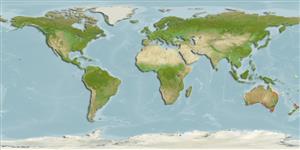Environment: milieu / climate zone / depth range / distribution range
البيئة
بحري القاع; نطاق العمق 0 - 10 m (Ref. 5316). Temperate
Western Pacific: Southport, southern Queensland to Port Phillip Bay, Victoria, and off Rottnest Island, Western Australia.
الحجم / وزن / العمر
Maturity: Lm ? range ? - ? cm
Max length : 15.9 cm SL ذكر/ مختلط الجنس; (Ref. 5316)
Found over sand, rubble or vegetation; two specimens taken from floating Sargassum. Ovoviviparous (Ref. 205). The male carries the eggs in a brood pouch which is found under the tail (Ref. 205).
Life cycle and mating behavior
النضج | التكاثر | وضع البيض | بيض | الخصوبة | Larvae
Male carries the eggs in a brood pouch (Ref. 205).
Dawson, C.E., 1985. Indo-Pacific pipefishes (Red Sea to the Americas). The Gulf Coast Research Laboratory Ocean Springs, Mississippi, USA. (Ref. 5316)
IUCN Red List Status (Ref. 130435: Version 2024-2)
استخدامات بشرية
أدوات
تقارير خاصة
Download XML
مصادر علي الأنترنت
Estimates based on models
Preferred temperature (Ref.
123201): 14.8 - 24.6, mean 18 °C (based on 395 cells).
Phylogenetic diversity index (Ref.
82804): PD
50 = 0.5625 [Uniqueness, from 0.5 = low to 2.0 = high].
Bayesian length-weight: a=0.00037 (0.00016 - 0.00085), b=3.18 (2.99 - 3.37), in cm total length, based on LWR estimates for this (Sub)family-body shape (Ref.
93245).
مستوى غذائي (Ref.
69278): 3.4 ±0.5 se; based on size and trophs of closest relatives
المرونه (Ref.
120179): عالي, الحد الزمني الأدني لتضاعف عدد أفراد المجتمع أقل من 15 شهر (Preliminary K or Fecundity.).
Fishing Vulnerability (Ref.
59153): Low vulnerability (10 of 100).
